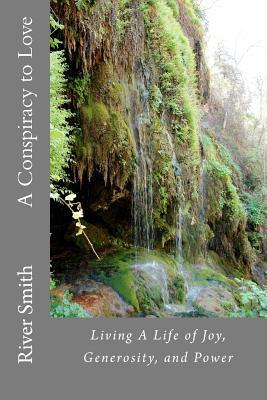Title: A Conspiracy to Love: Living A Life of Joy, Generosity, and Power
Author: River Smith
Publisher: Satyagraha/Liberation Brew
ISBN: 9780982926239
Pages: 217, Paperback/Kindle
Genre: Self-Improvement/Inspirational
Reviewed by: Jason Lulos, Pacific Book Review
Book Review
First, this is a self-transformation book. It is a “glass-could-be-half-full” book if you have the courage to (ful) fill it. Refreshingly, any political or otherwise dogmatic agenda you might intuit as subtext is, in fact, not implicit. Smith’s text and subtext are both explicitly the project of creating conditions equality and coexistence: for everyone. He addresses the way we eat, speak, move, think and interact with others, suggesting ways not only to make yourself and others happier and more productive, but also to get what you want. So it is altruistic and constructively selfish; or self-empowering is perhaps more appropriate.Smith cites real examples from his experience as a social activist and a therapist. He provides practical explanations, sometimes with open ended questions meant to provoke thoughtfulness or simply because such self and social transformations can be complex and require the reader to do the work. There are times when these examples spring seemingly out of the blue, yet Smith does so with the useful effect of a re-sensitizing shock to the system; overcoming indifference to the suffering of others, distant or near, is part of his project. Midway through the book, a cogent philosophy emerges as a symbiosis between self and world.
A Conspiracy to Love: Living a Life of Joy, Generosity, and Power is a conspiracy because it threatens the passive way individuals and cultures continue to accept suffering and how we reluctantly or unconsciously pass this ideology on to future generations. In this sense, Smith’s book is more than a self-help, make-you-feel-better-about-your-place-in-the-world guide. Smith’s project is revolutionary in its call to expose the conditions that make suffering and hate possible; this exposing exposition challenges the reader to change his or her way of thinking and extend that personal transformation to a that of analogous conditions in the world.
Smith’s reciprocating, dual process begins with deconstructing the individual, revealing the conditions which prevent the individual from becoming more loving, open and confident. The newly authentic individual is then primed to extend that selfness to others, generosity being, fortuitously, a natural inclination for happier, self-reliant people. This reciprocating dualism is not a dichotomy. The integrated self and social transformations will necessarily reflect on and reconstruct each other, reinscribing conditions more conducive to love than hate in personal and social realms. This self-world progression (paying it forward) is necessarily self-reliant and becoming generous.
For the most part, the book doesn’t promote a political ethos, but the book does express the need for social change and the need to end persecution of women, homosexuals, African-Americans, and the list goes on. Yes, he does mention the gross inequality between the 1 and the 99 percent. But, for readers who may cringe at reading anything seemingly antithetical to their beliefs, the book is not inherently political. His analogies stay consistent to the point expressed in the subtitle: constructing and redistributing conditions for joy and generosity. Subsequent redistributions of power and wealth will take care of themselves.



Follow Us